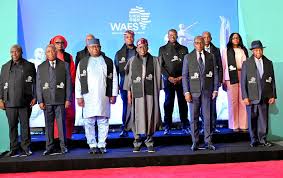In a landmark development aimed at rescuing West Africa’s ailing regional integration efforts, Nigeria and the Republic of Benin have entered into a sweeping bilateral agreement that both countries say will serve as a model for deeper economic, trade, and diplomatic ties across the Economic Community of West African States (ECOWAS). The agreement was sealed in Abuja on Wednesday June 18th at the inaugural West Africa Economic Summit (WAES), with Presidents Bola Ahmed Tinubu of Nigeria and Patrice Talon of Benin presiding over the signing ceremony.
The pact, which formalizes full-scale bilateral integration between the two neighbouring nations, was executed by Nigeria’s Minister of Industry, Trade and Investment, Dr. Jumoke Oduwole, and Minister of State for Foreign Affairs, Ambassador Bianca Odumegwu-Ojukwu. Their Beninese counterparts—Shadiya Alimatou Assouman, Minister of Industry and Trade, and Shegun Adjadi Bakari, Minister of Foreign Affairs and Cooperation—signed on behalf of the Republic of Benin.
According to a statement issued by presidential spokesman Bayo Onanuga, the agreement covers a wide array of joint commitments ranging from harmonized trade policies and cross-border infrastructure to security cooperation and the creation of green job opportunities across both countries.
Speaking at the summit, President Talon hailed the pact as “a bold step toward real, actionable regional integration,” stating that Nigeria and Benin were ready to demonstrate what genuine cooperation could look like in a region marred by fragmentation and economic underperformance. “President Tinubu and I have agreed on full integration between Benin and Nigeria. The responsibility now lies with our ministers to implement it,” he said. “Benin and Nigeria are more than twins—we are the same people. Let us show the region that integration is possible.”
In a deeply reflective keynote, President Talon did not shy away from criticizing the structural failures that have plagued ECOWAS since its inception. Citing the paralysis of signature projects like the West African Gas Pipeline and the West African Power Pool, Talon lamented what he described as “ridiculous administrative bottlenecks” that have rendered regional infrastructure initiatives ineffective.
He recalled how Benin, after years of waiting for functional gas transmission via the ECOWAS-backed pipeline, had to resort to importing gas from Qatar through a floating storage and regasification unit. “This failure of regional cooperation wastes resources and undermines integration,” Talon declared, adding that unless decisive steps are taken, even heavily financed projects will remain white elephants.
On the Lagos–Abidjan Corridor—a key highway designed to link five West African capitals—Talon bemoaned the continued harassment of travellers at border checkpoints, which he said discourages trade and regional movement. “A businessman should be able to travel from Lagos to Abidjan in hours—not days—without facing harassment at multiple checkpoints. That is not integration,” he said.
He concluded with a sober warning that poverty remains the region’s most formidable destabilizing force. “Poverty is the main threat to democracy, security, and stability. If we do not address poverty through integration, our values will remain hollow,” Talon stated.
Wednesday’s agreement marks one of the most ambitious efforts by any two ECOWAS member states to bypass the sluggish pace of regional policy implementation by forging a direct path to unity. It also affirms President Tinubu’s stated regional agenda to reposition Nigeria as both an economic powerhouse and diplomatic leader in West Africa following years of diplomatic fatigue and internal insecurity.
As the ministers now move into the implementation phase, analysts say the success or failure of the Nigeria–Benin integration model could set the tone for ECOWAS’ future—especially in the wake of recent setbacks including military coups in member states and growing public disillusionment with the bloc’s relevance.
For now, both nations have positioned themselves not just as neighbours, but as partners in the quest to reimagine West Africa’s future.



